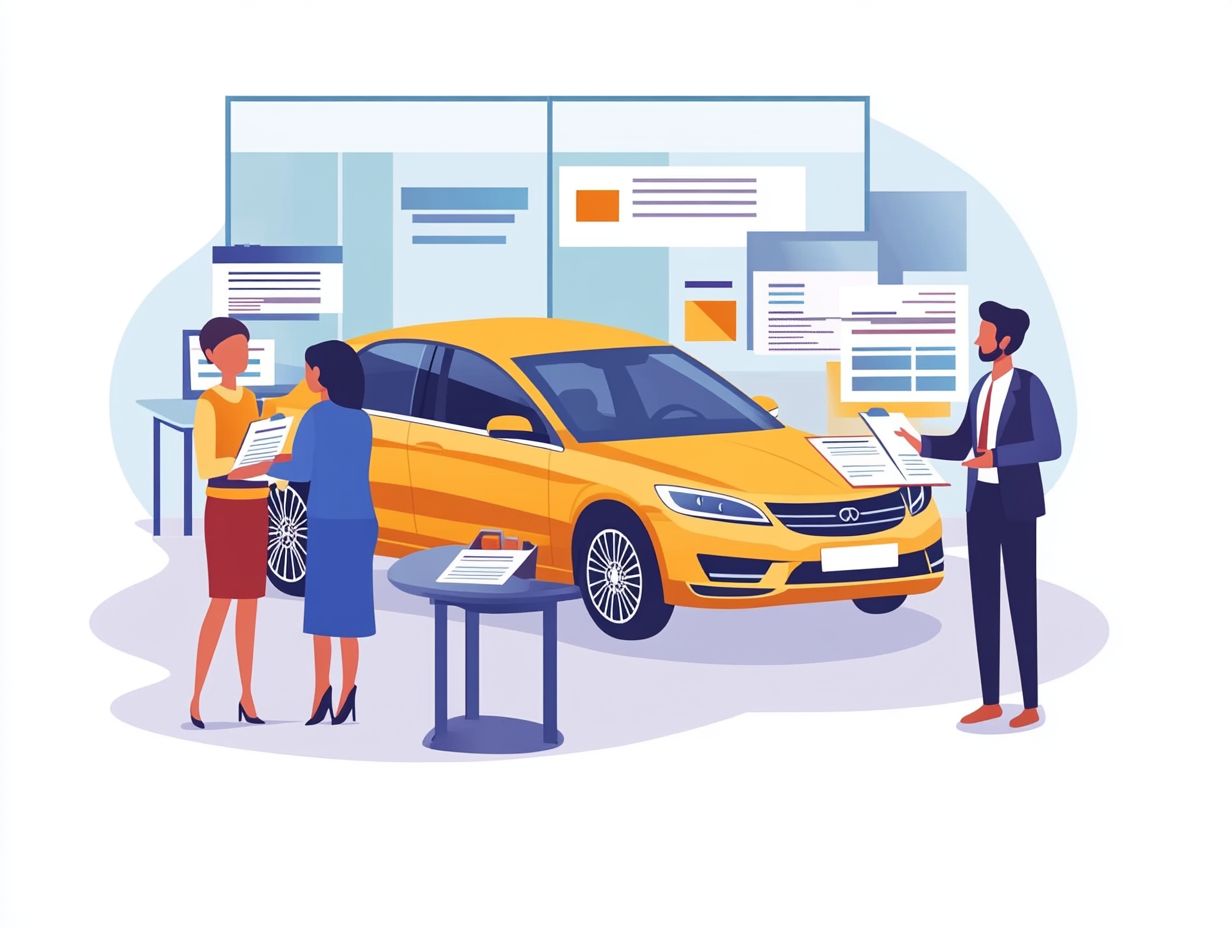5 Options for No Credit Car Financing
Navigating car financing can be challenging, especially if you have no credit history. Luckily, there are many ways to get behind the wheel without needing an established credit score.
This article covers five excellent options for securing car financing with no credit. From traditional auto loans to Buy Here Pay Here dealerships, we ll look at the pros and cons, requirements, and tips for approval.
You will learn how to avoid scams in this market.
Ready to find the right financing option for you? Let s dive in!
Contents
Key Takeaways:

Traditional auto loans are a good choice if you want to buy a car. They require a down payment and proof of income.
Buy Here Pay Here dealerships are a type of dealership that offers in-house financing to buyers with no credit check, but they often have higher interest rates and may require a large down payment.
Credit unions may provide lower interest rates and more flexible requirements for no credit car financing, making them a great option to consider. For those looking to explore their options, following 5 simple steps to financing your dream car can be very helpful.
1. Traditional Auto Loans
Traditional auto loans are a good choice if you want to buy a car. These loans typically offer competitive interest rates, transparent terms, and a variety of amounts, allowing you to select a financing plan that matches your financial needs.
Interest rates usually range from 3% to 7%, depending on your credit score and the lender s policies. Payment schedules are often structured over three to seven years, giving you flexibility in budgeting.
It s essential to compare offers from multiple loan providers to secure the best rates and terms. If you have a higher credit score, you can expect more favorable loan terms. For those with lower scores, refinancing options can help improve your financial situation and lower your monthly payments.
2. Buy Here Pay Here Dealerships
Buy Here Pay Here dealerships offer a unique financing approach for buyers with challenging credit histories. They allow you to finance your vehicle purchase directly through the dealership, often requiring little to no down payment and providing flexible payment options.
This model simplifies your car-buying experience, allowing you to choose your vehicle and drive away with financing arranged on-site, without relying on traditional lenders.
For individuals facing challenges from poor credit histories, these dealerships represent a viable path to dependable transportation. However, it’s crucial to stay aware of potential drawbacks.
Many financing options come with higher interest rates than conventional loans, which can lead to significant long-term costs. Additionally, you may find the vehicle selection somewhat limited, and stricter payment schedules could present future challenges.
3. Credit Unions

Credit unions are member-owned financial institutions that often provide more favorable auto loan terms, including lower interest rates and better customer service. This makes them an appealing option for anyone seeking car financing.
Unlike traditional banks, credit unions typically have more flexible loan requirements, making it easier for borrowers from various financial backgrounds to get approved.
Checking your loan eligibility without affecting your credit score allows you to gauge your options, aiding in budgeting and informed decision-making.
Furthermore, credit unions are known for their strong community ties and personalized customer service, enhancing your overall experience with tailored solutions for your financial needs.
4. Personal Loans
Personal loans are unsecured loans that you can use for a variety of purposes, including purchasing a vehicle. This provides you with the flexibility to finance your auto loan without the burden of collateral, like the car itself.
This aspect makes personal loans particularly attractive for borrowers who may not have enough equity in other assets or prefer not to put their new vehicle at risk. While personal loans can offer competitive interest rates compared to traditional auto loans, it s essential to consider your credit history. Your credit score plays a critical role in determining both your eligibility and the rate you will receive. Generally, those with higher credit scores tend to secure more favorable terms.
On the other hand, traditional auto loans typically feature lower interest rates and extended repayment options linked directly to the car’s value. This could lead to overall savings, despite the requirement for collateral.
5. Co-Signer on a Loan
Having a co-signer on your auto loan can significantly enhance your chances of approval, especially if your credit history isn t exactly sparkling. The co-signer’s credit score can unlock better loan terms and lower interest rates, making the entire process much more favorable for you.
This added layer of assurance for lenders often leads to a higher potential loan amount, giving you access to better financing options for your vehicle purchase.
Remember that these advantages come with responsibilities. The co-signer is equally liable for the loan, meaning any missed payments could negatively impact both of your credit scores.
Therefore, making timely payments isn t just a matter of protecting your credit health; it s also about maintaining the trust and financial commitment you share with your co-signer.
Is No Credit Car Financing the Best Option for You?

Navigating the world of no credit car financing can be quite the endeavor, as it offers various options specifically designed for individuals without a credit history. However, it’s essential for you to carefully assess potential interest rates, loan terms, and consider 5 ways to save on auto financing costs before making any commitments.
While some financing opportunities might initially catch your eye, they often come with higher interest rates and unfavorable terms that could lead to significant financial strain over time. For example, while buy-here-pay-here dealerships, which allow you to purchase a car directly from them often without a credit check, can provide immediate access to a vehicle, this convenience usually conceals the risk of exorbitant interest rates and limited repayment flexibility. To avoid such pitfalls, consider reviewing the 5 steps to take before financing a car.
To protect yourself from such pitfalls, take the time to thoroughly research a lender s reputation through online reviews and the Better Business Bureau. It s also crucial to scrutinize the fine print of any loan agreement, ensuring you fully understand repayment schedules and any hidden fees before you sign on the dotted line.
What Are the Pros and Cons of Each Option?
Evaluating the pros and cons of various auto loan options such as traditional loans, credit unions, buy-here-pay-here dealerships, and personal loans is crucial for making an informed decision that aligns with your financial situation and vehicle purchase goals.
Understanding these types of loans can greatly affect not only the affordability of your monthly payments but also the total cost of the vehicle over time. For example, traditional loans generally offer competitive interest rates, although they typically require a good credit history to secure the best terms.
On the other hand, credit unions can provide more personalized service and flexible payment options, although their availability may be more limited compared to larger banks.
Buy-here-pay-here dealerships tend to cater to those with bad credit, but they generally come with higher interest rates and less favorable terms.
Personal loans offer flexibility in amounts and uses but can sometimes have higher rates that merit careful review. Each option presents unique factors that you should consider, ensuring you choose what truly fits your needs.
What Are the Requirements for Each Option?
Knowing what is required to get an auto loan can help you get approved. The criteria can vary widely across options like traditional loans, credit unions, and Buy Here Pay Here dealerships. Factors such as your credit score, the size of your down payment, and whether you have a co-signer can all play a role.
This knowledge helps you make smart choices while navigating the diverse loan products that different financial institutions offer. Traditional lenders typically prefer applicants with a solid credit history and a larger down payment. Credit unions might provide more flexible terms for those with less-than-stellar credit.
Conversely, Buy Here Pay Here dealerships often cater to individuals with lower credit scores, though this convenience usually comes with higher interest rates. Recognizing how these requirements differ, it’s advisable for you to assess your financial profile carefully to discover the most suitable loan option.
How Can You Improve Your Chances of Getting Approved?

Improving your chances of securing an auto loan involves a series of strategic steps. Focus on enhancing your credit score, understanding the details of the loan, and using prequalification tools to gauge potential interest rates and payments before you apply.
By honing in on these elements, you position yourself favorably when approaching lenders. Check your credit history carefully consistent bill payments and reduced debt can significantly elevate your credit rating.
Making a substantial down payment not only reduces the overall loan amount but also leaves a positive impression on lenders. Engaging in prequalification means checking your potential loan options without affecting your credit score.
Keep communication open with lenders. Asking insightful questions about the loan process can streamline your application, making the entire experience more efficient and less stressful.
What Are the Risks of No Credit Car Financing?
While no credit car financing might appear to be an appealing option for those without a credit history, it comes with its share of risks. You could face potentially high-interest rates, unfavorable loan terms, and the chance of working with lenders that lack a solid reputation. Instead, consider exploring tips for financing a car with bad credit to find better solutions.
These factors can lead to monthly payments that are simply unmanageable for many borrowers, increasing the likelihood of missed payments and incurring penalties. This cycle of debt can spiral quickly, making it difficult to regain financial stability.
To navigate these challenges, it s wise for you to conduct thorough research on lenders. Compare interest rates and terms to secure the most favorable conditions. Building a small savings cushion before financing and considering alternatives like co-signers or secured loans can also enhance your financial security and alleviate the burden of steep payments in the long run.
How Can You Avoid Scams in the No Credit Car Financing Market?
Avoiding scams in the no credit car financing market requires vigilance and thorough research. As a buyer, it’s essential to vet lenders and check their BBB ratings, as well as understand different car financing options.
Familiarize yourself with common red flags that indicate fraud. Use online platforms to read reviews and testimonials from previous customers.
Ask friends, family, or coworkers for reputable lender recommendations. Their insights can help you find trustworthy options.
Carefully examine interest rates, repayment terms, and any hidden fees. Understand how the loan will impact your finances.
Taking these proactive steps boosts your confidence. It also reduces the risk of falling victim to dishonest lenders in this market.
Frequently Asked Questions
What is no credit car financing?
No credit car financing means getting a car loan without a credit history. This is often a choice for people who have not built a credit score or have a low one.
What are the 5 options for no credit car financing? The five options are: 1) a loan from a credit union, 2) finding a co-signer, 3) using a buy here pay here dealership, 4) in-house financing, and 5) a subprime auto loan (a loan designed for those with poor credit). For first-time buyers, it’s also helpful to consider the top 5 financing options available.
How can I find a credit union for no credit car financing? You can find a credit union by researching online or asking friends for recommendations. Additionally, consider reviewing 5 questions to ask before financing a new car, as visiting a local credit union can also provide information about car loan options for those without a credit history.
What is a co-signer and how can they help with no credit car financing?
A co-signer is someone with a good credit history who agrees to take responsibility for the loan if the main borrower can t pay. Having a co-signer can improve your chances of loan approval and may help you get a lower interest rate.
Are there any downsides to no credit car financing? One downside is that you may face a higher interest rate compared to those with good credit. It’s crucial to think carefully about your options and budget before choosing a loan, especially when considering how to handle used car financing options.
Is it possible to improve my credit score through no credit car financing?
Yes! Making timely payments on your car loan can help you build a positive credit history and improve your credit score over time.






